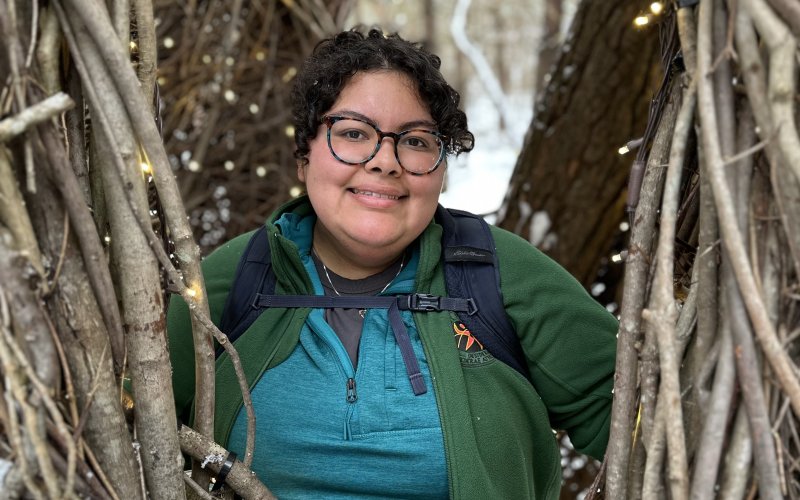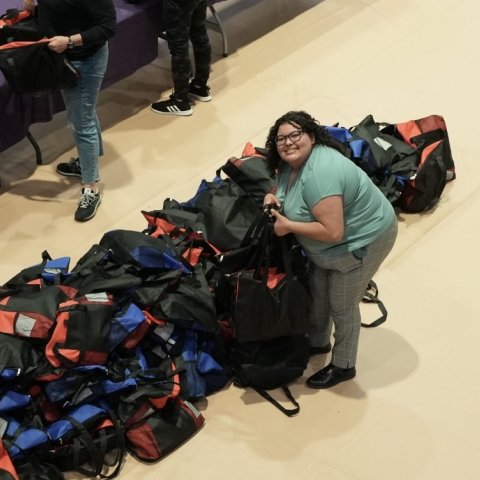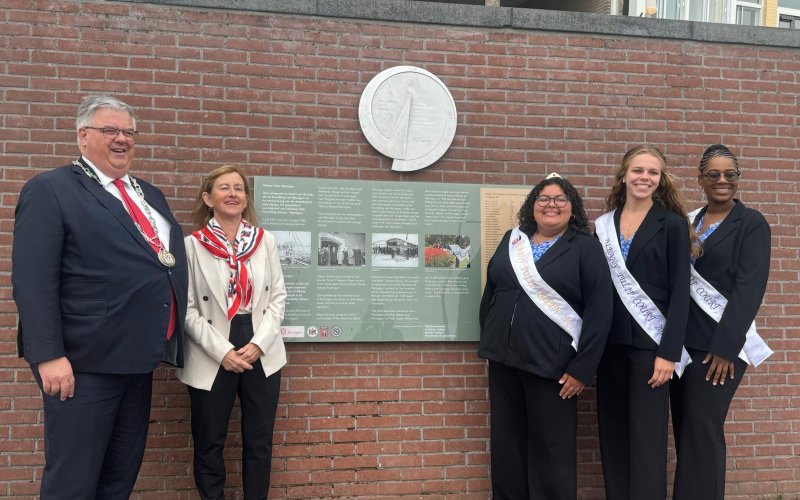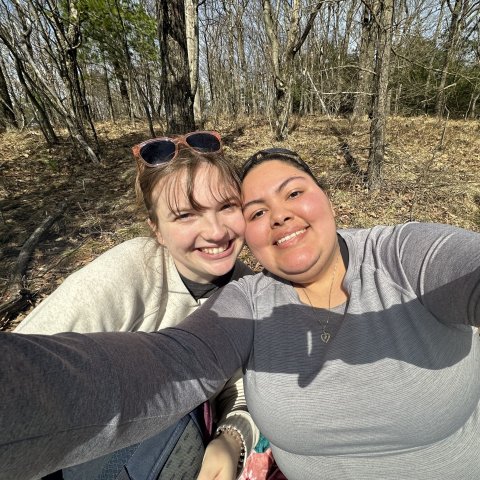Q&A with Naishaly Vélez Galán, Survivor Advocate in UAlbany’s Office of Health Promotion

By Erin Frick
ALBANY, N.Y. (Oct. 22, 2024) — Naishaly Vélez Galán is an integral member of the Office of Health Promotion, serving in the role of survivor advocate since July 2023. A proud University at Albany alum, Vélez Galán holds a bachelor’s degree in sociology and theatre.
As an undergrad, Vélez Galán was deeply involved in the Student Association Senate, which spurred her interest in turning advocacy into action. As senate chair, much of Vélez Galán’s work focused on creating space for students who were survivors of power-based personal violence (i.e., intimate partner violence, sexual assault, stalking, trafficking and exploitation).
While connecting students with existing resources, Vélez Galán and her fellow Senate members identified an institutional gap: services were available, but there was a need for a dedicated advocate to guide and support students using these resources. In collaboration with Student Association colleagues, university administrators and the Office of Health Promotion, Vélez Galán supported the creation of new and expanded advocacy resources for students on campus.
Vélez Galán shared insights on her role at UAlbany, key tenants of survivor advocacy, and how she is serving the broader community this year as the 2024 Albany Tulip Queen.
How did you come to the Office of Health Promotion?
During my undergraduate career, I was the chair of the Student Association Senate. In this role, I honed my advocacy skills and was able to collaborate with leaders at the University to address the needs of our student population. It was deeply inspiring to see how student organizing and collaboration can produce real institutional change.
One initiative I feel especially proud of during my time in the Student Association is some of the work we did advocating for survivors. As student leaders, we heard from our peers and learned from meeting with those directly impacted, that while reporting options and resources for mental and physical healthcare were available, there was a need for guidance around accessing and navigating these systems.
Through listening to my peers and connecting and collaborating with my (now) colleagues in the Student Association and University administration, we learned that there was alignment between what we were seeing as students and institutional efforts already in progress. By working together, we supported the creation of new and expanded advocacy resources for students, collaboratively designed with students. From this experience, I knew I wanted to do something that would allow me to learn and grow within these passions, and I am thrilled to be able to do that within this role.
Broadly speaking, what does ‘survivor advocacy’ entail?
Survivor advocacy serves as the wrap-around support network for students as they navigate a traumatic period of their life. This entails four main functions: navigation, support, systems change and education.
Navigation includes helping survivors determine their safety needs and connecting them with resources both on and off campus to meet these needs. For students who choose to use on-campus reporting options, we advise them as they navigate that process. Limiting re-traumatization is an important part of this. We have developed pathways for students to access resources efficiently; these systems minimize the number of times they have to retell their story, and ensure they are treated with respect every step of the way.
Second, we provide a supportive space for students to process their experiences of trauma, including experiences accessing resources—from the criminal justice system to healthcare, to academic accommodations and everything in between. Our students often come back to us to share their experiences navigating these various resources, policies and processes.
This is where the third function, systems change, comes in. When we are tuned into multiple students’ experiences, this enables us to better collaborate with partners on and off campus to improve services for survivors. We are lucky to work with partners who care deeply about the well-being of our students, and we are grateful to continue to build out these relationships and networks on campus and in the community.
Education is a key part of survivor advocacy. In your approach, what does this include?
In our work with survivors, we provide education on reporting options, campus and community-based resources, what trauma responses look like and how these responses can impact someone’s lived experience. A big part of this is diving into skills for healthy coping and self-care, and determining which resources are relevant to each person’s unique experiences and goals.
We also provide education on power-based personal violence, highlighting similar patterns that exist across different types of violence. This understanding can be validating and affirming for a survivor. Realizing that what happened to them is not their fault can help someone move forward. Once someone can recognize and accept that another person (or people) chose to hold power and control over them—and it wasn’t about what they did or didn’t say or do— creates a foundation of empowerment, and folx can shift in their identity from victim to survivor.
What do you do in your role? How can students seeking services connect with your office?
As survivor advocate, I meet directly with student survivors. I always approach these meetings from a place of curiosity. By asking questions, I am often able to learn not only about the experience that brought a student to our office, but also about things in their life that matter to them.
It’s important that I don’t assume what someone is looking for. Some students want information about reporting, others want help communicating with professors, and others just want someone to listen. Depending on what someone is looking for, we craft individually catered plans that center empowerment and include resources and services to meet each student’s needs.
When someone has experienced power-based personal violence, they have had power and control taken away or exerted over them. As they begin their journey of healing, it is essential to help them regain that power and control in their life. Our approach centers a trauma-informed lens. Using this approach of nonjudgement and compassion, we are able to support survivors as they begin to take steps towards autonomy and healing.
Any student who would like to set up a meeting can get in touch via:
- Phone: (518) 956-8477
- Email: [email protected]
- Visit the Sexual Violence Support and Advocacy webpage
Beyond UAlbany, you are currently serving as Albany’s 2024 Tulip Queen. What activities are you undertaking in this role?
The Albany Tulip Queen and Court is a program in which the Tulip Queen and four Court members act as ambassadors for the City of Albany. We dedicate one year—from our coronation to the crowning of the next Queen—to serving the City of Albany and its citizens. This year, I had the pleasure of volunteering alongside inspiring female leaders at community events such as Alive at Five, Dad Fest and Movies Under the Stars.
The Tulip Queen and Court also lead the Mayor’s Literacy Program. This year, our literacy program, “Bloom and Grow” is seeking to educate elementary school aged children on the dimensions of wellness, and how they can care for their own emotional, social, physical, intellectual and environmental wellness. I am so excited to be able to step into classrooms alongside the Tulip Court to educate the next generation of leaders on the importance of caring for their health and wellbeing.
What do you enjoy doing in your spare time?
I enjoy hosting my friends and family over a home cooked meal, accompanied by a board/card game (I will always suggest Catan), and a walk around my neighborhood. I am also a regular Friday night karaoke singer.
Recently, I have loved traveling! I have enjoyed visiting Orlando, Florida, Nassau, Bahamas, Wilmington, Delaware, and Philadelphia, Pennsylvania. In my role as the City of Albany 2024 Tulip Queen, I also had the opportunity to visit Nijmegen, Netherlands (Albany’s Sister City) last month. While there, I represented the City of Albany as part of a delegation sent to further our city’s relationship. It was an honor to participate in the unveiling of a plaque highlighting the history of the sisterhood between Albany and Nijmegen, while also making time to visit colleges, museums, historical sites and a brief trip to Germany. This trip is an excellent example of all the things I love doing—visiting a new place, with good food and even better people.







